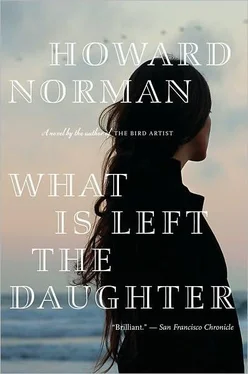Cornelia Tell became grandmother, nanny, advice giver, our one real friend in the village, a blessing, and she loved you. Because of her kindness, a few people played out their godly judgments by no longer frequenting her bakery. "I get the picture," Cornelia said. "Pretty simple, though. They chose against me, and I chose against them right back." And it got peculiar with Leonard Marquette. At one point he actually paid good money for an attorney to try and take me to court to recoup his medical bills. But during their first meeting, when Leonard claimed he'd slipped on a pool of invisible blood, the lawyer, a Mr. Auchard — he'd thoroughly reviewed the stenographic report of the magistrate's hearing — quit the case on the spot.
In those days, there were no nearby bed-and-breakfasts, and the closest inn was in Truro, so shortly after you were born, I moved into the rooms above the bakery. That brought gossip, of course. It couldn't be helped. One morning, Cornelia lamented from behind the counter, "My failing is that I never kept a guest book. I mean, in just the past five years, look who I've had stay upstairs! Look who could've signed a guest book! Do you know what was most unexpected, though?"
"I can't imagine," I said.
"What was most unexpected was how complicated life got in the rooms above a simple bakery, that's what. I mean, I could write a book — if I could write a book."
In time, though, to Tilda's and my great surprise and relief, all sorts of neighbors came around to look at you, like they would any newborn. They brought stuffed animals and other gifts. Mrs. Oleander knitted you mittens and a tiny hat with ear flaps, which you wore every time we left the house in cold weather. You were a beautiful child. It was frequently commented on that you had many of your mother's features — already at age one, for instance, you showed a mop of unruly black hair just like Tilda's! You were practically being raised in the bakery, we sat with you there so often. We showed you off like any new parents would. I'd purchased a second gramophone from Randall Webb and set it up in the shed, and you'd fall asleep to music, snug in your bassinet, while I worked on a toboggan.
I arrived to the kitchen for breakfast every single morning without fail. But the truth was, we didn't add up to a family. We just could not have. It was, Cornelia said, more like a mother and father with their own addresses, unwed, permanently fixed in workable estrangement. Though we did share your beautiful life. Your beautiful life.
One could say that it was more than many people had.
Still, from the night Tilda and I had spent in the library, it was an uphill climb. One night, a little drunk and drowsy from two glasses of wine at supper, Tilda said, "To be honest — and I don't mean to be hurtful, Wyatt."
"That probably means you will be," I said. "I'm ready."
"Next morning, I was disgusted by what happened in the library. Add remorse. But as for our daughter, she's made me the happiest I could ever imagine being in my life. How's that for tricks?"
Tilda's and my life together was the steepest uphill climb, is how it felt. During the very last conversation Tilda and I had, not more than three hours before you left Middle Economy for Denmark, we'd sat at the kitchen table, of course, above the bakery. Tilda said, "I don't ever want our daughter to think it was only because of her that you and I stayed together. Eventually, out of guilt or out of something, we'd probably have got married, just to sanction us being parents in the eyes of God. Like Reverend Witt already asked us to. Fate has it, our daughter has loving parents who don't love each other, not in the way they should, which she'd figure out sooner or later. I'll have to explain a lot while she's growing up. Where's her father? I know I'll need to tell her. But on the ship overseas Uli and Marcus will have time with Marlais. Then in Denmark they'll have us, and we'll have them. And let's just wait and see where life takes us, as Mom liked to say. Let's just wait and see."
"Won't it be as if Marlais is half orphaned, what with you living in Denmark and me living here?" I asked.
"I'd say come visit, but the thought of you stepping foot outside of Nova Scotia?" Tilda said. "If that actually happened I'd believe miracles never cease. On the other hand, Marlais is your daughter, too. Denmark is locatable, Wyatt. A train to Denmark arrives to Denmark. You wouldn't get lost.
"Uli and Marcus say it's a beautiful country. You bring your saws and chisels over and learn to live there, maybe some nearby town from us. Learn to live there. Just like Marlais and I now have to learn to live there. To my mind, it's no more impossible a prospect than Hans faced when he wanted to live here in Canada. But, Wyatt, I simply can no longer raise Marlais by this part of the ocean. I cannot stay in Middle Economy. It took Uli's invitation for me to come to my senses about this. But I came to them."
"Do they have professional mourners in Denmark, I wonder."
"I don't know. But if they do, I'd need to learn the Danish language for that, don't you think, to do it properly? No, probably I'll find a different line of work. I'm resourceful, eh? The good thing, no matter what, is that Marlais will have, not exactly grandparents, but close as you can get."
"So much conviction, Tilda, that your plans will work out for the best."
"Less that, Wyatt, than I'm basing my decision on what I know of our past. Yours and mine."
I parked my car just down from the Esso station, close enough to watch your mother and you, hand in hand, climb onto the bus to Halifax. Mr. and Mrs. Mohring had left on an earlier bus. They were to meet you at the Lord Nelson Hotel. Then you'd steam across to Europe. A few days later I received a postcard: Bon voyage to us, it read. It was signed Your cousin Tilda Mohring. The way she put her signature made for more distance between us than the Atlantic Ocean.
You and Tilda were gone. And one final thing that convinced me that Tilda was genuinely starting a new life: she left behind The Highland Book of Platitudes, in clear view on her bedside table. I'd moved back into the house.
The day the church bulletin printed Hans's obituary was the day I began to let the sled-and-toboggan concern fall apart. Early the next morning, a Monday, I tacked the obituary to the shed wall near the door. I didn't hit a nail, sand a crossboard, fix a runner to a frame or paint a stripe — didn't attempt to do any work at all. I put on a gramophone record, cannot recall which one. Yet when the needle bobbed in the last groove, when the static began, I could hardly lift myself from my uncle's cot. Instead, I threw a hammer, which struck the tone arm, making the needle screech off the record.
Soup for supper, and afterward, all evening, no gramophone music in the house, no child's voice. Sitting at the kitchen table, I got the picture, as Cornelia might say. Absolutely, absolutely, absolutely, I got the bleak picture: this is how my days and nights in the house would be. And though it took a full two months to dismantle the business my uncle had built up over thirty years, it was just four days after you'd gone that I sat at the long table in the library and consulted the Halifax telephone directory, jotting down the names, addresses and telephone numbers of hotels. I composed letters to twelve hotels, asking about availability and rates. I enclosed a return postcard and stamp in each envelope. In a sense, I was already gone from Middle Economy.
I did manage to take an inventory, but it was an inventory of sleds and toboggans I'd never make. Sleds owed and promised, toboggans owed and promised. The shed was full of half-mades, slush boards not yet shellacked, cargo boxes not yet fitted. I brainstormed about selling the business, but after posting notices in the church bulletin, the Halifax Mail and the Truro newspaper, there were no takers. Not a single telephone call or postcard of inquiry. But what should I have expected? As Cornelia put it, "You know, Wyatt, when you think about it, who'd be interested? Probably have to be somebody who already makes sleds and toboggans and wants to move to Middle Economy. The only persons I think actually ever could fit that bill are Donald Hillyer and you." Eventually I sold off the surplus wood to Todd Branch.
Читать дальше












